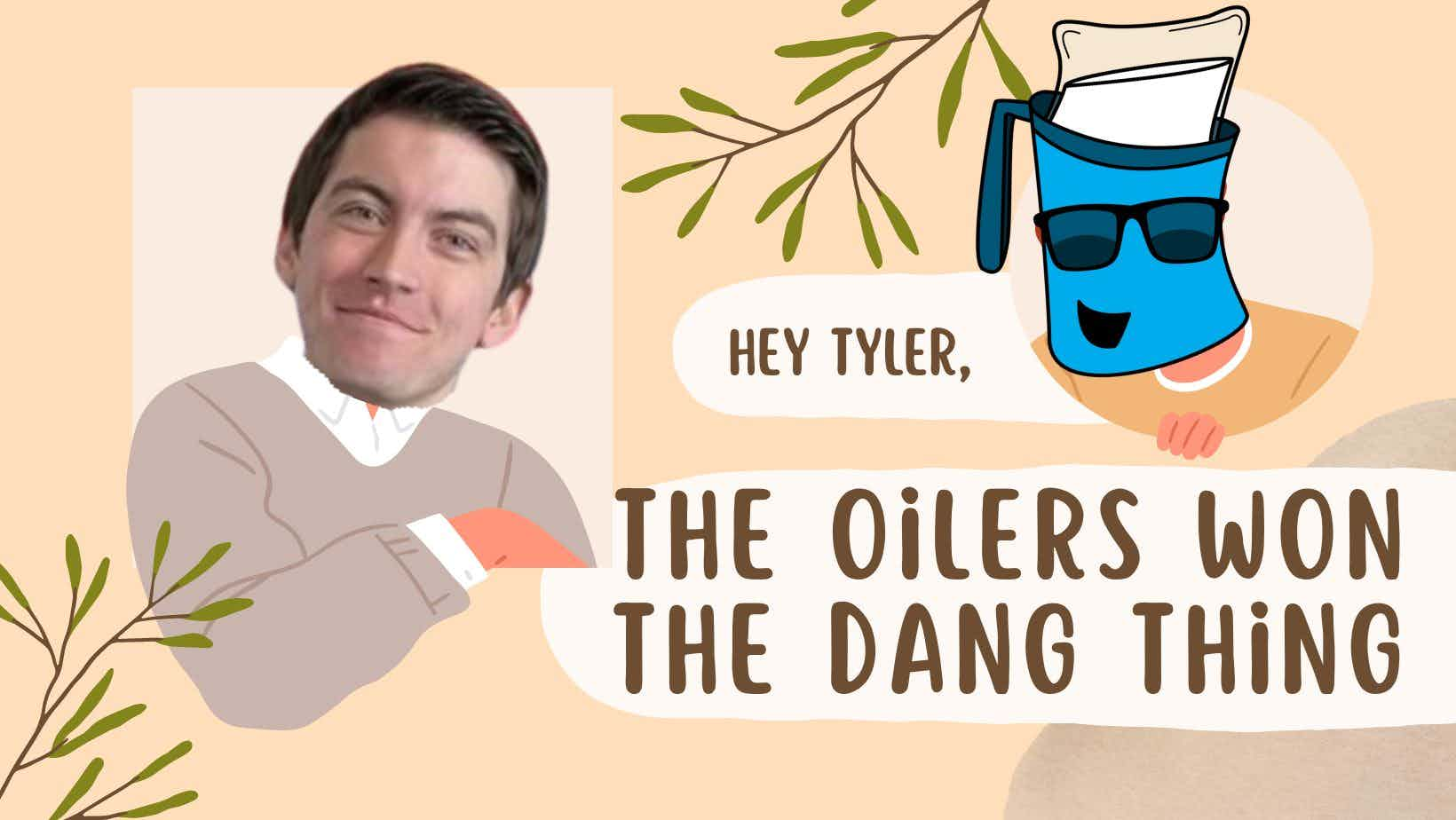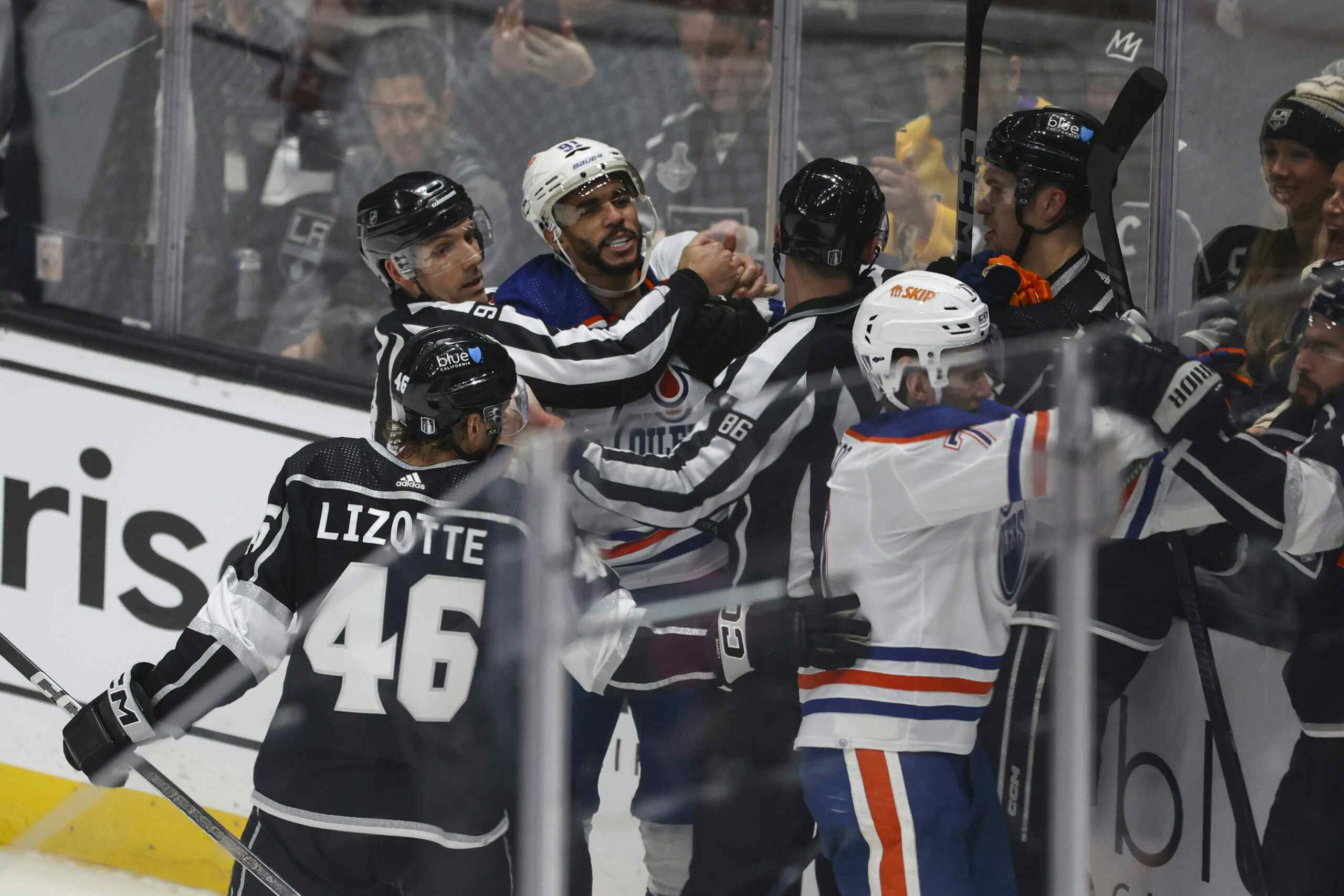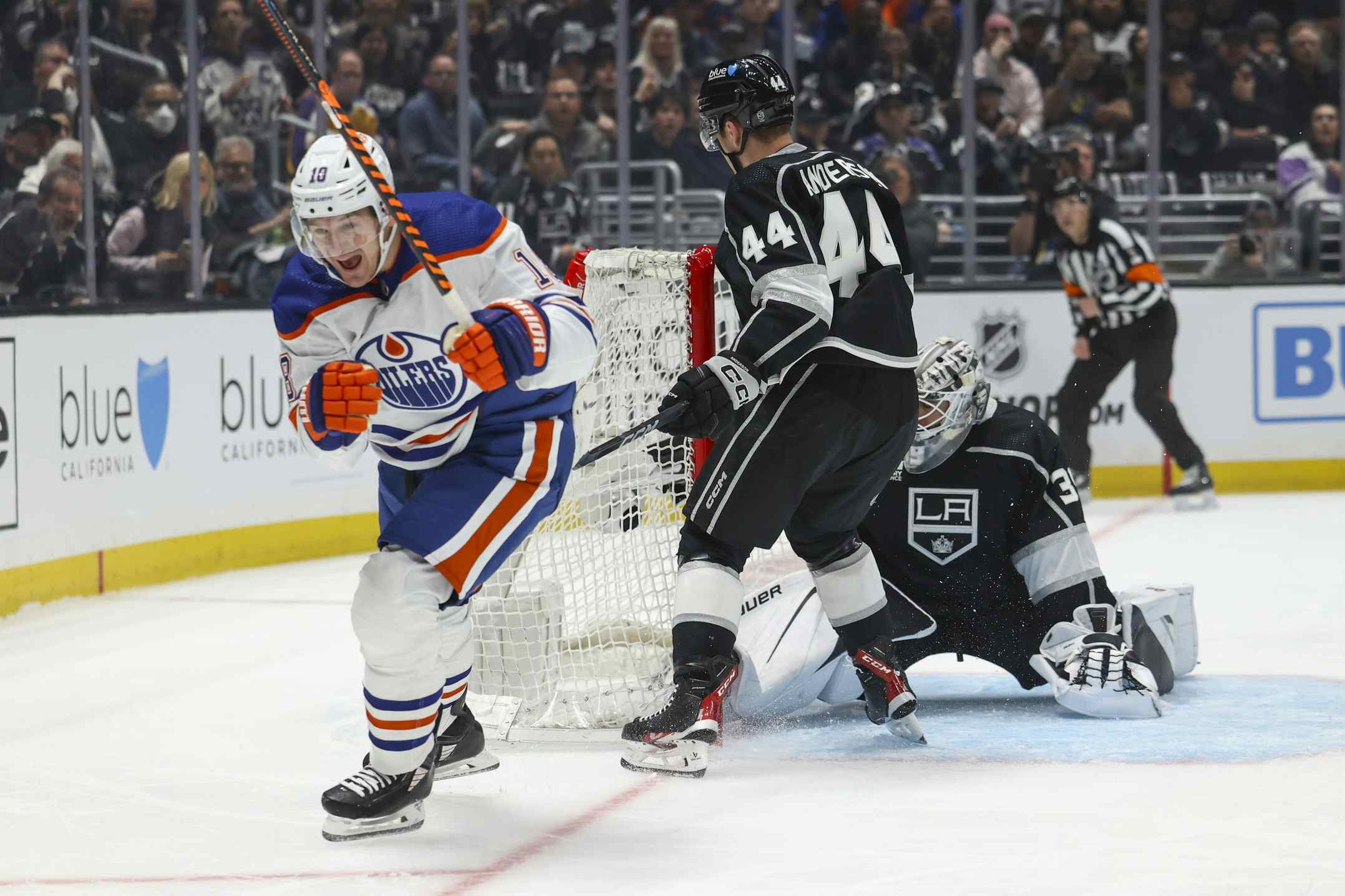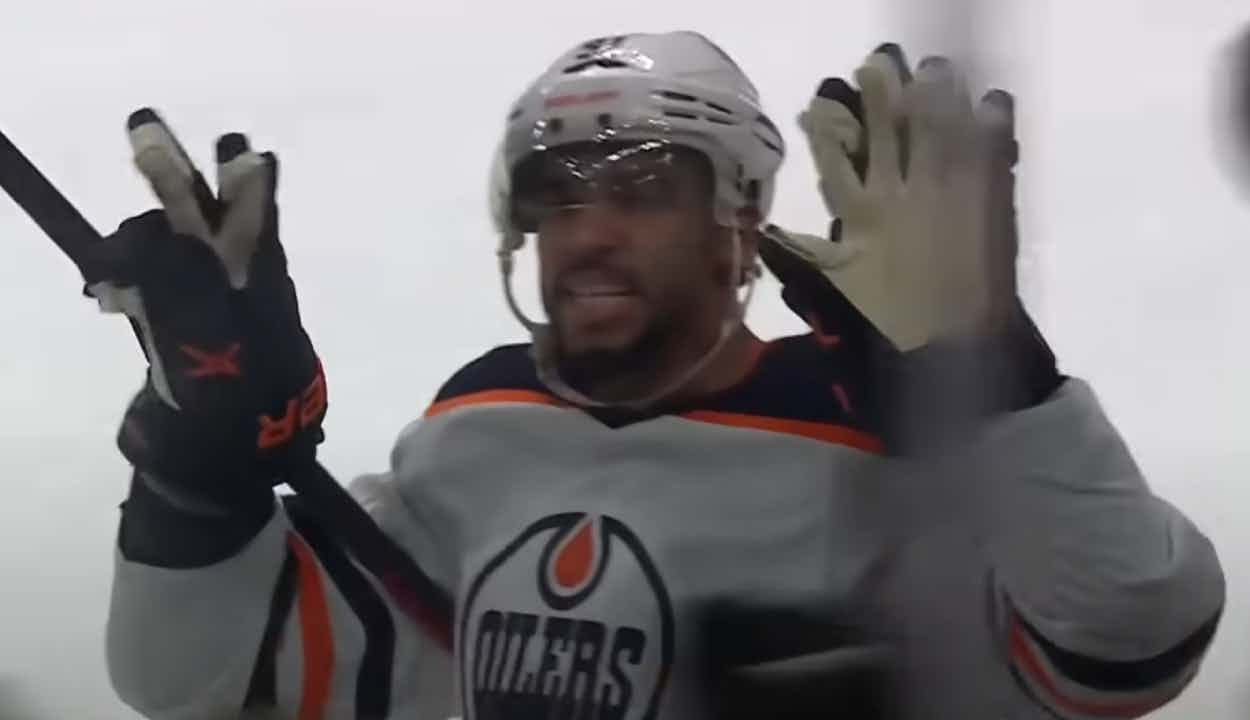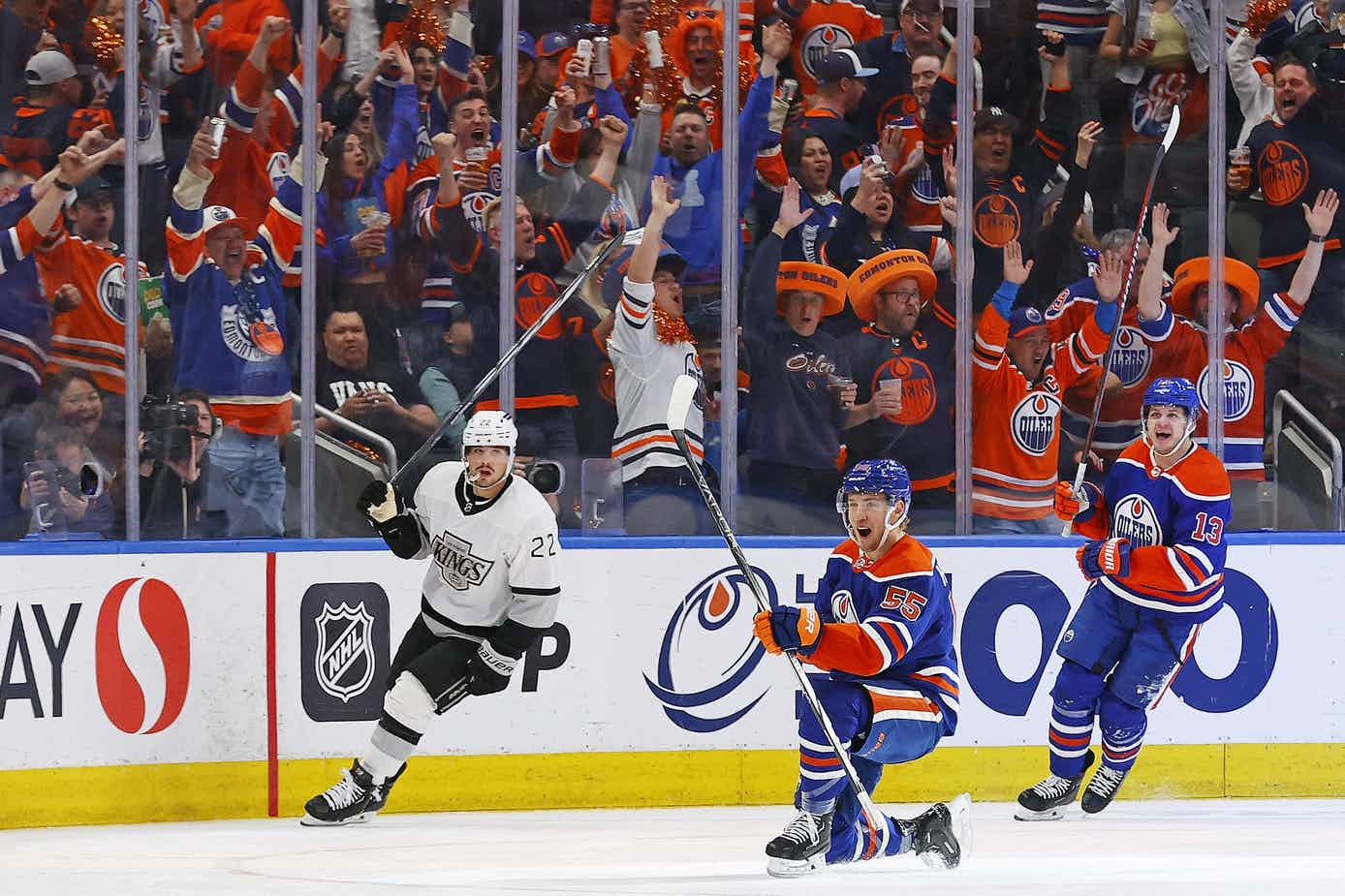TAMBELLINI TALKS PROSPECTS AND INJURIES
By Jason Gregor
11 years ago
While the NHL and NHLPA continue battling over money, Edmonton Oilers general manager Steve Tambellini has been touring the world watching Oilers players and some of his best prospects. The GM had some interesting things to say about Justin Schultz as well as some disappointing news regarding a few Oiler-related injuries.
Jason Strudwick and I chatted with Tambellini yesterday on my show and here’s a recap of our conversation.
Jason Strudwick and I chatted with Tambellini yesterday on my show and here’s a recap of our conversation.
JG: Let’s start with the unfortunate news; Oscar Klefbom. What can you tell us, we’re hearing that he’s likely done for the year?
ST: Well he got into a kind of funny position and just fell on his shoulder from what we understand. We know that Oscar needs to have a few more tests; our doctors are speaking with the doctors that take care of their club there. So it looks like he’s going to need some surgery, but we’ll make sure that we get all of the information first.
JS: How hard is it to get information, especially when they’re all of the way in Sweden it must be hard to coordinate and get everyone on the same page?
ST: That is one thing that we’ve worked very hard at, from a player development perspective and a communication aspect, and Ken Lowe has done a really good job with this, is setting up a relationship with the trainers of the junior teams, colleges and it’s his job also to be in contact with medical staff. Most people do speak English very well and in fact I think Ken knew one of the medical trainers in Sweden from his time with team Canada. So we’re lucky from that standpoint that we have a pretty good relationship with most of the teams.
JG: You got the opportunity to see a lot of your drafted players in the Super Series, most notably Nail Yakupov. Give me your thoughts on how he’s played.
ST: It’s been an interesting year for Nail. He’s such a big personality on and off of the ice, there’s no question about it. Obviously he had a very good start in the KHL; I think that he had 10 goals in 14 games and it’s not the most offensive, high scoring games usually in the KHL under normal circumstances. So he’s taking care of business there.
I was only able to see the last two games in Vancouver and Victoria. I think that he had a good start to the series. He was a little quieter in the last two games that I saw. He showed flashes of offensive brilliance, but I’ve seen him play with more vigour than I saw the last couple of games.
JS: How difficult is it for you to evaluate a player that’s been drafted on your team or looking ahead to future drafts when the Russians are playing six games in ten nights? I think that it would be very hard to evaluate those games where they’re not 100%.
ST: It is hard. The Russians brought over a heck of a team this year. And of the criticisms in the past was that they didn’t bring over enough ‘A’ players for these series. But they did this year.
So you’re right, that’s a lot of games in 10 days to go across Canada. And every team was different, and so every team is fired up to get a piece of the Russian players physically and on the scoreboard. So by the end, I think that you could tell with their body language that they had pretty much had enough. The last game the Russian team was very strong against the WHL squad, and I give them a lot of credit because they were tired. It’s good to see how players react when they are clearly tired.

JG: Mitch Moroz got hurt and didn’t play in the series, although you’ve seen him a lot in Edmonton, but you had an opportunity to watch Daniil Zharkov play a game, and Travis Ewanyk. Give us your thoughts on their progression?
ST: Yeah I was just talking to MacT about Zharkov, he just saw him play in Belville the other night. He’s a big man that is a good skater, has good skill, so there’s definitely something there for him. There’s no question about it that he has the ability. It’s going to be finding his type of spot in pro hockey. I believe that this kid will have a chance.
With Mitch Moroz, it’s too bad that he was injured just prior to the series, I would have loved to have seen because it was a heavy couple of games. The game in Vancouver, the type of hitting that was going on, it was like a playoff game to start the game and Mitch would have fit in there nicely. But he’s starting to come on now and use that size and strength that he has to his advantage.
Travis Ewanyk, I was able to watch him play the first game in Vancouver and he came out just guns a blazing with kind of reckless abandon that you love to see, but it’s also the type of play where you can be susceptible to injury. And sure enough a Russian D caught him along the boards and clipped his knees. I saw him at Rexall Place today, and he shouldn’t be out too long. It looks like a grade 1 sprain of the MCL.
JS: Steve, you’ve been around hockey for a while, even though you’re such a young looking man, and you look around…
JG: You don’t need a new contract…
JS: I should have said that a few years ago (laughs). But in all seriousness, you’ve been around hockey a long time, and you mentioned how it was a very hard hitting game. Can you speak to the evolution of, not just Canadian hockey, but also Russian hockey and Finnish hockey, and how every country is starting to play more and more like Canada, and how Canada has had to bring in more skill development to their game?
ST: You’re bang on there Jason because I saw the under 20 over there and I also went to see one of the second tier leagues in Sweden the night before I left. Never before had you watched games on the big ice where would you see people finish their checks when they could. There was always a turn away, and then get back into a defensive zone, defensive mindset immediately.
And now you’re seeing them on the forecheck trying to take away that first player, trying to be aggressive on the second player, so when you watch the best on best they’re all playing the same game, there’s not really a difference. That heavy forecheck now, for the experienced players is really not there. Now it becomes, OK, are you able to handle it and do you have the skill to counter that, or take advantage of the situation. So it’s getting closer and closer to being one game, there’s no question about that.
JG: Steve, how do you function right now in the lockout as far as your overview of the team? You’re seeing some of your prospects spread out all over the country. Have you had a chance to see Hemsky, Smid, or Gagner play? Do you keep tabs on those guys, or do you focus most of the guys in the system.
ST: Good question. We do keep tabs, but this was a very tight trip in terms of seeing games and getting back to see the Russian WHL game, so I didn’t have a chance to see some of our Oiler players playing. But we do keep tabs on them and we follow them to see statistically what they’re doing and just try to make sure that we’re updated if there is any type of injuries or anything like that.
JG: How often have you seen the American League Team? What are you thoughts on Justin Schultz?
ST: Well I’ve seen a lot of games in OKC for sure. And the nice thing about it is that we do have so many of our young players there. Yes you want to win every hockey game, but they’re playing in a very, very difficult league, it’s tough, it’s competitive, and there are very good American hockey league players that can play both ways for you. So just because you had some success in the NHL does not mean that it’s a guaranteed success at that level also.
So I’m very happy about the fact that they’re there and they’re growing together. I like the fact that it places some leadership responsibilities, added to what they would have here with the Oilers in players like Jordan Eberle and Taylor [Hall] who is going into their third year and Ryan [Nugent-Hopkins] who is a second year pro, but especially for guys like Jordan and Taylor where people are looking for examples of how do I practice every day, how to I react after a win, how do I react after a loss, how coachable am I.
I told them that ‘all of the players are going to be looking at you guys to see how you handle yourselves in these situations.’ So there are great opportunities for growth from the leadership standpoint of these guys.
You mentioned Justin Schultz and I guess everyone feels that there would be some sort of transition at the American League. Offensively, he’s been special from the standpoint of creating and just his natural instincts. I said, just a few weeks ago, and I know that the coaches wouldn’t be happy with me, but I feel like he’s a player that has not been over coached. He sees openings or a chance to make a play, and he makes it.
He’s led the rush on a lot of plays a lot of times and he’s come up with big goals or big passes at the right time, so you have to be pleased with him. You have to also be aware of the fact that going to the National League will be different for him. I think he’ll have some success. Of course I wish that we were playing in the NHL now, but I’m really excited, that he’s had a chance to go to the AHL first and experience that, it will give him so much further experience before he begins in the NHL.
JS: I got a chance to watch that second game in Abbotsford and I really zoned in on the D-men, obviously that’s what I know the best, and clearly the offensive side of the game is there for Schultz. But something that I didn’t expect, and that really surprised me, was his use of his stick. I mean he had a stick that was in the lane, he had a quick stick. Coaches always talk about poking pucks away and being in the lanes. Was that something that you had known before, or were you surprised at how well he uses his stick?
ST: That’s a great point because that’s exactly what Todd Nelson and Gerry Fleming were talking about in OKC, that he’s incredibly smart. He has a great stick; you’re bang on with that. And his defensive positioning more often than not is in a good spot. There are some things that are a little different from a strength standpoint with the pro players and the college players, but overall he is a very deceptive, with a quick stick to defend.

JG: Joanne Ireland had an article a while ago about Nikolai Khabibulin and Andy Sutton’s health. Andy Sutton has said that he’s not sure if he’ll every play again. Do you have an update on the health of those two?
ST: Nik has been on the ice, he’s been skating I believe this week with Freddy Chabot and working his way in. We’re hoping that he’s ready somewhere maybe in the second week of December, maybe sometime around there. He’s always been a fit person; he’s been in the top 10% of the class at all times with overall fitness so he’s working hard to get his body back to ready to play. So if we’re still not playing I’m sure that he would explore something, probably in the KHL.
JG: And Sutton?
ST: With the surgeries that I think that he is going to have, Andy will have a tough time coming back this year. It’s unfortunate, but we were informed that he hurt himself during training sessions and he had to get something done with his knee that is going to, I think, prohibit him from probably playing this season.
JS: When you look around and you see all of these guys going to play for Europe, are GMs excited to see guys going over there and happy that they’re playing ,or do they look on line more hoping that their player doesn’t come up with an injury?
ST: Well, you’d rather see people probably here. For instance, for us to have most of the players in OKC is a real good thing. You don’t want anyone taking time off from a game, so it’s good they are playing, but yet injuries are a concern. There’s such a fine line from someone having that edge and not having it when you get to the pro level, especially in the National Hockey League and from a developmental standpoint you probably need to be on the ice.
JG: Are you confident that we will see hockey at some point this year?
ST: I hope so. I’m staying optimistic.
JG: Bob Green acquired David Musil so now people in the organization can see him more often. What do you like about Musil’s development and is his foot speed where it needs to be, or is that one main element that he needs to work on?
ST: I think that David always recognizes that you can always get better at that, and he’s working on it. I think that his intelligence and compete level will always get him to the right spots, and he’ll play against the other team’s good players. He’s a big man that’s smart and can defend and that’s a big thing of playing against good players, you have to have the intelligence to defend against good players along with the ability.
He’s a hard worker off of the ice and I don’t see his skating being a problem by the time he gets to play pro hockey.
WRAP UP
I did ask Tambellini a question about the lockout, but he preferred not to comment, so I took out that question.
Sutton’s injury will allow Corey Potter to be the 7th D-man, barring any moves, when the season eventually begins. I’d expect the Oilers to try and find another physical D-man who can kill penalties to complement Smid and Peckham.
Unless we see a resolution this week, it looks like Khabibulin will be ready in time to start the season, albeit as Devan Dubnyk’s backup.
Here’s a quick update on the Oilers currently playing in Europe:
Ales Hemsky: 12 goals, 22 points in 18 games for Pardubice.
Yakupov: 10 goals, 14 points in 14 games in the KHL. He was playing in Super Series the past two weeks.
Ladislav Smid: 2 goals, 11 points in 17 games for Liberec.
Sam Gagner: 5 goal, 8 points in 9 games in Austria.
Lennart Petrell: 8 goals, 8 points in 14 games for Helsinki.
Corey Potter: 0 goals, 3 points in 13 games for Vienna.
Yakupov: 10 goals, 14 points in 14 games in the KHL. He was playing in Super Series the past two weeks.
Ladislav Smid: 2 goals, 11 points in 17 games for Liberec.
Sam Gagner: 5 goal, 8 points in 9 games in Austria.
Lennart Petrell: 8 goals, 8 points in 14 games for Helsinki.
Corey Potter: 0 goals, 3 points in 13 games for Vienna.
RECENTLY BY JASON GREGOR
Recent articles from Jason Gregor

